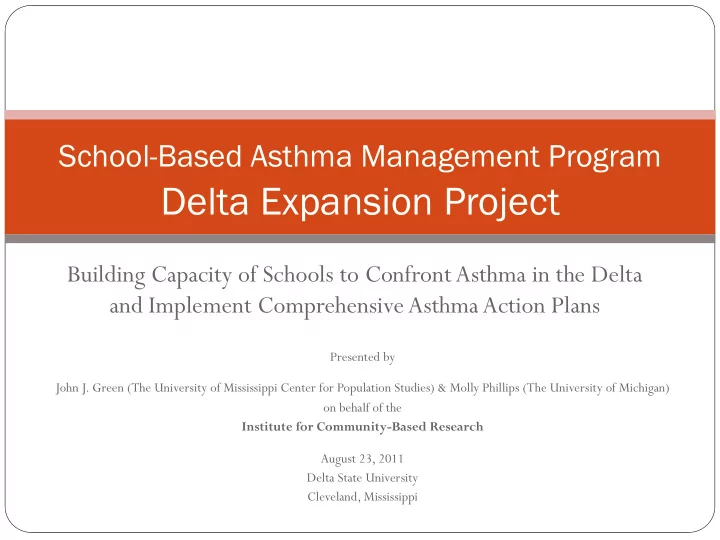

School-Based Asthma Management Program Delta Expansion Project Building Capacity of Schools to Confront Asthma in the Delta and Implement Comprehensive Asthma Action Plans Presented by John J. Green (The University of Mississippi Center for Population Studies) & Molly Phillips (The University of Michigan) on behalf of the Institute for Community-Based Research August 23, 2011 Delta State University Cleveland, Mississippi
Asthma in the Delta Estimated youth asthma rates (CDC, 2009; DRP 2009/2011): USA: 22% of children have ever been told they have asthma MS: 18.2% of children have ever been told they have asthma MS Delta: 25.8% (2009) / 24.5% (2011) of children have ever been told they have asthma Why are asthma rates so high in the Delta? Environmental conditions (e.g. pesticides, burning fields, plant clippings, mold) can all trigger asthma problems Poor housing and school building conditions High poverty rates and limited access to adequate health care
SAM-DX Action Research Process Needs assessment/determination Workshops and meetings with school representatives to build capacity Community meetings Focus group with families with children with asthma Key-informant interviews Ongoing support and technical assistance to school groups (including today’s workshop) Asthma Action Plan Advisory Council
June 2 nd Workshop 23 teachers, principals, school nurses, and coaches from 10 school districts in the Delta came to Cleveland for an all-day workshop Representatives from five counties: Bolivar, Sunflower, Leflore, Humphreys, Washington Purpose: Learn about asthma legislation Conduct needs assessment Develop draft Asthma Action Plans
June 2 nd Workshop Needs assessment “world café” activity: What are the most pressing issues facing schools, families, and children in regard to asthma in your school and community? What is being done to create healthy school environments for children with asthma? What services and resources are available for families with children with asthma in your school and community? What are gaps faced by families and children with asthma? What training and education opportunities are provided to school staff and community members concerning asthma management? What else is needed? Commonly raised concerns include limited education (among parents, school staff, students, etc.), poor air quality/poor environmental conditions, lack of continuity of care, limited school resources Opportunities/resources include school nurses, SAM, health fairs, smoke-free community initiatives, school health councils
June 2 nd Workshop Planning methods: Used Dreyfus Health Foundation’s Problem Solving for Better Health (PSBH) model Worked in teams to develop “good questions” “Will doing what, with whom, where, and for how long achieve the desired outcome?” Created drafts of comprehensive plans to address state-wide asthma legislation Four plans were developed Plans include: community outreach and education, school trainings, development of PSAs, diverse methods for obtaining individual student forms about asthma management Key learning points: importance of communication, collaboration, and education
Follow-up Meetings Follow-up meetings were held with representatives and community members from five school districts Participants included parents, superintendants, representatives from community organizations, nurses, school staff, and a city mayor Plans, in draft form, were presented to meeting participants who then provided feedback and offered additional ideas Outcomes: Additional support gained, amplified community members’ voices, plans expanded upon with new ideas Key learning points: If a child has EVER had a diagnosis of asthma, they will always have asthma and need an individual Asthma Action Plan Diverse opinions and viewpoints are essential to effectively address community health
Family Focus Group As part of the needs assessment process, a focus group was conducted with participants of the Wheezy Bear Asthma Camp and their parents Purpose: To understand what resources are available and accessible to families with children with asthma and what additional resources or programs would would be beneficial Outcomes/ideas: Gaps in resources: no nurse at some schools, few people trained in medical care at schools, limited communication between doctors and families What would be beneficial: community awareness/outreach campaigns with clear and concise explanations of asthma triggers and management techniques (also posters with pictures), increased parental engagement, greater emphasis on prevention Key learning points: Families want forums to have their concerns heard Young people often feel embarrassed about asthma – we must work to build a more supportive environment for our youth
Key-Informant Interviews Interviews were conducted with 4 physicians, 2 administrators, and several nurses at 2 different community health centers Purpose: To discuss the role health care providers and health centers can play in addressing asthma in the Delta Outcomes/ideas: Importance of education with families (including how and when to properly administer medication, importance of maintenance and control vs. rescue medication, etc.) Build relationships between health centers and school nurses Work with mobile health units to address asthma and include asthma action plan forms with general health consent forms Develop marketing campaigns Key learning points: Medicaid dictates medications youth can and cannot have access to – systems changes are necessary so that youth get the medicine they need Community health clinics can play a large role in addressing asthma in the community, and are now required to monitor and report asthma rates
Asthma Action Plan Advisory Council Expert panel of professionals representing health and related organizations Carley Jefcoat, Mississippi Primary Health Care Association Wanda Jones, Mississippi Office of Nursing Workforce Pamela Hoyt-Hudson, Dreyfus Health Foundation John J. Green, The University of Mississippi Center for Population Studies Review and offer feedback on asthma management plan components Provide insights concerning regional needs and potential solutions for schools to better meet their responsibilities in partnership with families and health care providers
What’s Happening Now School groups are moving forward with their plans and increasing community awareness about asthma and the new state-wide legislation Ongoing efforts by SAM staff to promote asthma awareness Ongoing technical assistance offered to schools Piloting SAM program to address asthma triggers in homes
Sources Centers for Disease Control and Prevention, 2009 Youth Risk Behavior Surveillance System Delta Rural Poll, 2009/2011 Images: http://www.20x200.com/art/2008/09/cotton-field- mississippi.html http://www.digital-topo-maps.com/county-map/ mississippi.shtml Photos by John Green, Judith Winford
Recommend
More recommend